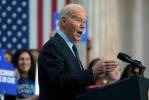EDITORIAL: President Donald Trump moves to streamline infrastructure projects
Amid the pandemonium surrounding the events in Charlottesville and Steve Bannon’s departure from the White House, the Trump administration was able to make progress last week toward improving the nation’s infrastructure.
The president issued an order intended to lower regulatory barriers to infrastructure projects, while also speeding up and streamlining the permit and clearance process.
During the Obama presidency, Congress passed transportation funding laws in 2012 and 2015 that included dozens of streamlining provisions. But the reforms themselves have been strangled by red tape. According to a spring report by the Transportation Department’s inspector general, the department has completed the work necessary to implement a majority of the provisions in the 2012 law, but they haven’t implemented because regulators still have to make changes to meet requirements in the 2015 law.
This is not surprising to Bloomberg View columnist Cass R. Sunstein, who served as administrator of the White House Office of Information and Regulatory Affairs under Barack Obama. Mr. Sunstein, no radical right-winger, wrote last week that, while the Obama-era reforms were helpful, more streamlining “needs to be done” and Mr. Trump’s executive order “provides an excellent foundation for achieving that goal.”
Under current law, Mr. Sunstein notes, developers are often bogged down by “an expensive and costly approval process” that can include multiple layers of environmental impact statements and contentious public hearings. And even if a project survives those hurdles, developers often face lawsuits from environmental groups, NIMBY activists and even competitors seeking to quash the competition.
“Environmental impact statements can run to hundreds of pages; they’re books, even encyclopedias,” he writes. “The review process can easily take three years or more, so agencies and developers sometimes just give up.”
Reform is also needed, Mr. Sunstein argues, in the bloated number of state agencies, local officials and federal agencies that have veto power, as well as in the bureaucratic culture that creates incentives for permitting authorities “to delay to require additional documentation or to just say no.”
Mr. Sunstein is most encouraged by Mr. Trump’s “one federal decision” provision, which designates a lead agency for every major infrastructure project with the responsibility “for navigating the project through the federal environmental review and authorization process.”
If Congress and President Donald Trump are ever going to build a bridge toward a successful infrastructure bill, it’s not only essential that the measure isn’t loaded with wasteful pork, but also that unreasonable bureaucratic hurdles don’t get in the way. The president’s executive order is a good first step toward paving the way for progress.




























